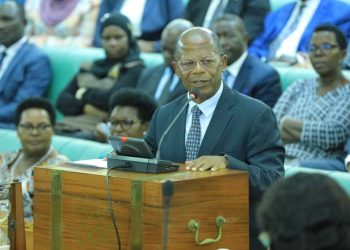Police commanders have been warned against engaging in unprofessional conduct, including fighting over suspects.
This in contained in a circular signed by the director of operations, Assistant Inspector General of Police Edward Ochom.
In the confidential circular dated October 14, Ochom warned that commanders of Kampala, Wakiso, and Mukono must wake up and perform as expected or they will be stripped of command responsibilities.
In the circular, Ochom raised eight key issues that are derailing the Police after a recent field visit by a team from Police headquarters to different regions. Police are established in all districts across the country with 18 administrative and operational directorates and 11 specialized units.
It operated 28 policing regions, 133 districts/divisions, 1,376 stations, and 805 posts as of July 2016. The number of stations is bound to increase following the recent confirmation of new cities. The circular referenced “Territorial Police command, command relations and force discipline” was addressed to the commandant Kampala Metropolitan Police, regional and district Police commanders across the country.
He cited lack of routine supervision by commanders in their respective areas of operation and that there is absence of teamwork among the commanders, especially district Police commanders (DPCs) and officers in charge of investigations and stations.
Disturbingly, the circular revealed poor cells management characterised by unnecessary stay of suspects in custody, mixing of juveniles with adults, poor investigations, selling of Police bond and in some cases fighting over suspects. Explaining the fight over suspects, a source, who spoke on condition of anonymity, said officers routinely clash over ‘juicy suspects’.
These are suspects arrested over cases involving huge sums of money. In other cases, officers clash to investigate simple cases to secure convictions (which is good for their appraisal) and distance themselves from complex cases, especially murder. The 2019 Police human rights manual indicates that when conducting investigations, officers will ensure that arrest shall be made after thorough investigations and that pretrial detention shall be the exception, rather than the rule.
The manual instructs investigators to promptly inform accused persons of the reason for their arrest and any charges brought against them — this must be communicated to the accused persons in a way and manner they understand. The manual was launched by the Police chief, Martins Okoth Ochola, at the Senior Command and Staff College in Bwebajja, Wakiso district last year.
Ochom also cited poor management of armouries, characterised by poor recordkeeping and poor care for guns and ammunition and that where there are construction projects going on, respective commanders do not get involved in the supervision process. Ochom also cited poor supervision on use of transport equipment, especially vehicles and motorcycles and bicycles.
The forces’ Strategic Policing Plan 2015/16-2019/20 indicates that Police has 1,404 motor vehicles, equipment and plants; 7,579 motorcycles, 36 vessels (boats), three aircraft and 18 donkeys. Of these, 282 vehicles and 957 motorcycles are uneconomical to maintain.
TAKE CHARGE
Ochom also raises the matter of the overstay of personnel at the same posts and district, low enforcement of force discipline and reminded territorial commanders to take full charge of areas of responsibility.
“Command must be exercised following respective chain of command,” Ochom noted, adding that, “full responsibility in areas of residents extends to all resources, human and non-human including supervision of all projects.”
“Commanders are fully responsible for maintenance and enforcement of police discipline on personnel under their command. Commanders must wake up and perform as expected.
Any officer who neglects his/her duty should show cause why he/she should not be stripped of command responsibilities,” Ochom said.
A source said officers routinely clash over suspects arrested on cases involving huge sums of money.
































































